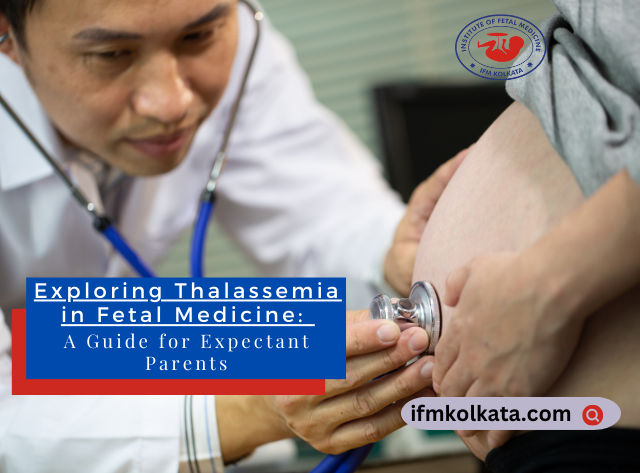Thalassemia, a group of inherited blood disorders affecting hemoglobin production, poses significant challenges in fetal medicine. This article aims to delve into the intricacies of thalassemia from the perspective of fetal medicine, exploring its genetic basis, diagnostic approaches, and evolving treatment strategies.
Understanding Thalassemia
Thalassemia is characterized by abnormal hemoglobin synthesis, leading to anemia. Fetal medicine specialists often encounter cases where one or both parents are carriers of thalassemia gene mutations. The severity of the disorder varies, ranging from thalassemia trait carriers with minimal symptoms to thalassemia major, a potentially life-threatening condition.
Genetics and Inheritance
Thalassemia is primarily inherited in an autosomal recessive manner. Two types of globin chains constitute hemoglobin: alpha and beta. Thalassemia is categorized into alpha and beta thalassemias based on which chain is affected. Fetal medicine specialists play a crucial role in identifying carriers and assessing the risk of thalassemia in offspring through genetic counseling and prenatal testing.
Understanding Thalassemia Inheritance and Diagnosis:
Genetic Complexity:
- Thalassemia, with its intricate genetic basis, involves mutations in the genes responsible for hemoglobin production.
- Fetal medicine specialists delve into the nuanced genetic landscape, explaining to families the complexities of autosomal recessive inheritance and the specific mutations associated with alpha and beta thalassemias.
Alpha and Beta Thalassemia Distinctions:
- Fetal medicine specialists delineate the differences between alpha and beta thalassemias, emphasizing the distinct genetic alterations in the alpha and beta globin genes.
- This nuanced understanding guides diagnostic approaches and helps tailor interventions based on the specific type of thalassemia.
Carrier Screening Advancements:
- Fetal medicine incorporates advancements in carrier screening techniques to identify individuals at risk.
- Expanded carrier screening panels, including a wide range of genetic mutations, contribute to a more comprehensive assessment of thalassemia risk, allowing for targeted genetic counseling and informed decision-making for prospective parents.
Prenatal Genetic Testing Modalities:
- Fetal medicine employs an array of prenatal genetic testing modalities to diagnose thalassemia during pregnancy.
- Technologies such as next-generation sequencing and advanced imaging techniques enhance the accuracy of prenatal diagnosis, providing crucial information for families and guiding decisions regarding intervention and treatment.
Early Intervention Possibilities:
- Identification of thalassemia carriers in the early stages of pregnancy allows for proactive and personalized management strategies.
- Fetal medicine specialists collaborate with obstetricians to offer early interventions, potentially mitigating the impact of thalassemia on the developing fetus through advancements like in utero transfusions or cord blood transplantation.
Precision Medicine Approaches:
- With the advent of precision medicine, fetal medicine specialists explore individualized treatment approaches based on the specific genetic mutations present.
- This tailored approach aims to optimize outcomes by addressing the unique genetic profile of each case, showcasing the evolving landscape of personalized medicine in thalassemia management.
Integration of Non-Invasive Techniques:
- Non-invasive prenatal testing (NIPT) continues to evolve as a valuable tool in thalassemia diagnosis.
- Fetal medicine specialists leverage the advancements in NIPT, combining it with traditional diagnostic methods for a comprehensive assessment of thalassemia risk without invasive procedures.
Diagnostic Approaches in Fetal Medicine
- Preconception Screening: Fetal medicine often begins its involvement with thalassemia through preconception screening, especially in populations with a high carrier rate. Identifying carriers helps couples make informed decisions about family planning.
- Prenatal Diagnosis: For couples identified as carriers, prenatal diagnosis becomes crucial. Techniques such as chorionic villus sampling (CVS) or amniocentesis allow for the assessment of fetal DNA, enabling early detection of thalassemia.
- Non-Invasive Prenatal Testing (NIPT): Advances in fetal medicine include non-invasive prenatal testing, which analyzes cell-free fetal DNA circulating in the mother’s blood. While not a primary diagnostic tool for thalassemia, NIPT can indicate a risk, prompting further diagnostic procedures.
Management and Treatment in Fetal Medicine
- Early Intervention: Fetal medicine specialists collaborate with obstetricians to provide early intervention strategies. This may involve transfusions in utero for severe cases, optimizing fetal outcomes.
- Cord Blood Transplantation: In cases where thalassemia is diagnosed early, fetal medicine opens avenues for cord blood transplantation, potentially curing the condition before birth.
- Gene Therapy: Ongoing research in fetal medicine explores gene therapy as a potential treatment for thalassemia. CRISPR technology and other genetic editing tools offer promise in correcting or mitigating the genetic mutations responsible for thalassemia.
Genetic Counseling and Family Support
Fetal medicine specialists engage in comprehensive genetic counseling, ensuring families understand the implications of thalassemia and their reproductive options. This support extends beyond diagnosis, addressing emotional and ethical considerations associated with genetic conditions.
Thalassemia in fetal medicine requires a multidisciplinary approach, combining genetic expertise, prenatal diagnostics, and evolving treatment modalities. As research progresses, fetal medicine continues to play a pivotal role in navigating thalassemia, offering hope for affected families and contributing to the broader landscape of genetic medicine.

